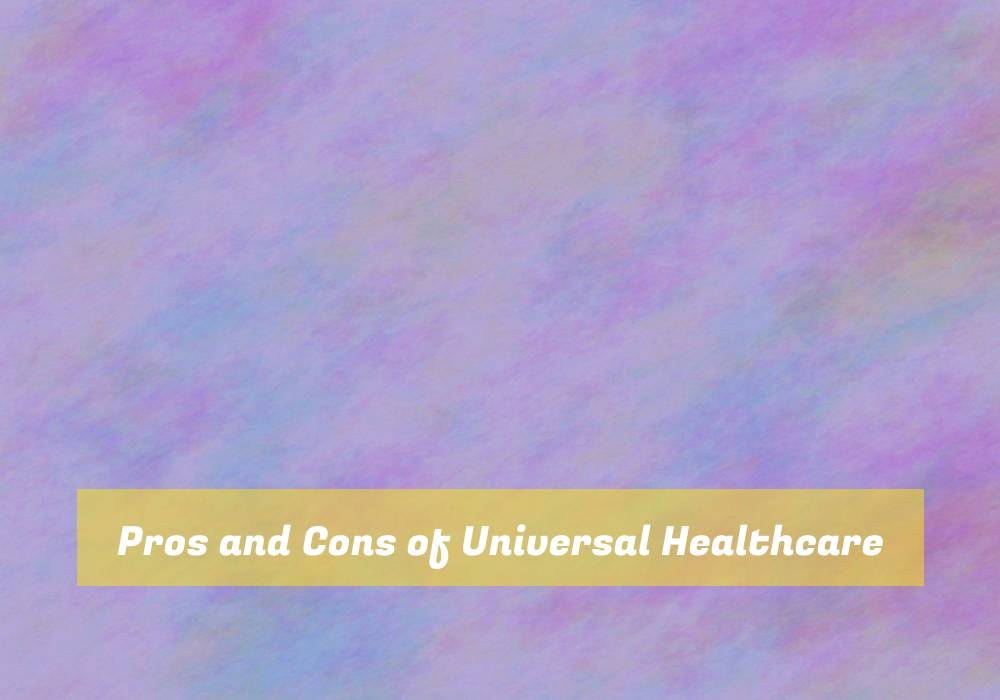Pros and Cons of Universal Healthcare
Have you ever considered the potential impact of universal healthcare on the overall well-being of a society?
The concept of providing healthcare to all citizens regardless of their ability to pay is a topic of great debate. While the idea of universal healthcare may seem ideal, it comes with its own set of advantages and disadvantages that are worth exploring.
As you weigh the pros and cons, youG??ll find that the implications of such a system extend far beyond the scope of healthcare itself, touching upon various aspects of society and the economy.
Advantages of Universal Healthcare
Universal healthcare ensures that all citizens have access to essential medical services without financial barriers. This means that no one has to worry about being unable to afford necessary medical treatment. With universal healthcare, you have the peace of mind that comes from knowing you can seek medical help without fearing the cost. This system also promotes preventive care, as regular check-ups and early interventions can help you avoid more serious health issues in the future.
Another advantage is that universal healthcare can lead to a healthier population overall. When everyone has access to medical care, diseases can be caught and treated earlier, reducing the spread of illness. This can result in a workforce thatG??s healthier and more productive, benefiting the economy as a whole.
Additionally, universal healthcare can help reduce healthcare inequality, ensuring that everyone, regardless of their financial situation, has access to the same standard of care.
Economic Benefits
With the improved health of the population, there comes a positive impact on the economy, making universal healthcare a key driver of economic benefits.
When individuals have access to preventive care and early treatment, theyG??re less likely to miss work due to illness, resulting in increased productivity. This can lead to higher overall economic output and a more robust labor force.
Additionally, universal healthcare can reduce the financial burden on businesses, as they no longer have to bear the full cost of providing healthcare benefits to employees. This can free up resources for businesses to invest in expansion, innovation, and job creation.
Moreover, with universal healthcare, thereG??s a potential for lower administrative costs, as a single-payer system can streamline the billing and claims process, reducing paperwork and associated expenses.
The government can also benefit from cost savings, as a healthier population may require less spending on public health programs and emergency services.
Improved Access to Healthcare
Improved access to healthcare enhances the overall well-being of individuals and communities. When everyone has access to healthcare services, theyG??re more likely to seek timely medical attention, leading to better health outcomes. With universal healthcare, you can visit a doctor for preventive care, chronic conditions, or acute illnesses without worrying about the financial burden. This means that you can address health concerns early on, preventing them from escalating into more serious and costly issues.
Additionally, improved access to healthcare can address health disparities among different socioeconomic groups. It ensures that everyone, regardless of their financial status, can receive the medical attention they need. This not only benefits individuals but also contributes to the overall health of the community. By ensuring that everyone has access to healthcare, universal healthcare can lead to a healthier and more productive society. It can also reduce the spread of infectious diseases by ensuring that individuals have access to necessary vaccinations and treatments.
Disadvantages of Universal Healthcare
As beneficial as improved access to healthcare may be, itG??s important to consider the potential drawbacks of universal healthcare in order to make an informed assessment of its overall impact.
One of the main concerns is the potential strain on the healthcare system. With more people seeking medical services, there could be longer wait times for appointments and procedures, leading to frustration for both patients and healthcare providers.
Additionally, the cost of implementing universal healthcare can be substantial, potentially leading to higher taxes or government spending. This financial burden may also impact the quality of care provided, as budget constraints could limit access to certain treatments or medications.
Another disadvantage is the potential for reduced innovation in healthcare. In a system where prices are regulated and standardized, there may be less incentive for research and development in new medical technologies and treatments.
Furthermore, some critics argue that universal healthcare may lead to decreased individual freedom and choice in healthcare decisions, as the government may have more control over medical options.
ItG??s important to carefully weigh these disadvantages against the potential benefits of universal healthcare.
Conclusion
Overall, universal healthcare has its advantages and disadvantages.
It provides economic benefits and improved access to healthcare for all citizens.
However, it also comes with its own set of challenges.
ItG??s important to weigh both the pros and cons in order to make an informed decision about the implementation of universal healthcare in any country.






It’s definitely an intriguing topic! I’ve found that when we look at universal healthcare, it really does spark conversations about our values as a society. For example, when I lived in Canada, I could really appreciate the peace of mind that came with knowing I could see a doctor without worrying about the bill. It seems to foster a cultural mindset around health that prioritizes well-being over profit.
You bring up a valuable point about the peace of mind that comes with universal healthcare. It does reshape how we think about health—shifting from viewing it as a commodity to seeing it as a collective responsibility. In Canada, the emphasis on well-being can be quite different from systems where profit tends to drive healthcare decisions.
You make a great point about how universal healthcare shapes our values. It’s interesting how access to care can alter the way people think about their health. In countries with universal systems, there’s often a shift away from that transactional mindset around healthcare. People can focus on prevention and wellness rather than playing a constant game of insurance roulette.